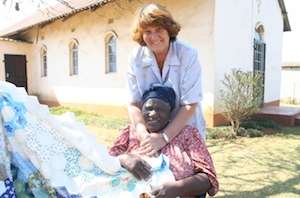Day 302: Sabie
The Van der Merwes give me a lift to Sabie. I find it incredibly difficult to watch them leave, but an anonymous sponsor puts me up at the Forest Lodge in Sabie for two nights and that gives me a chance to find some emotional distance.
After this break it is time to go and look up the Doyle family. One of my Johannesburg hosts, Kim, told me that her parents want to meet me if ever I should be in the Sabie area. ‘Just go to the hairdressers on the square and ask for Darling.’
Darling, who also goes by Lynne, is true to her nickname. I am hugged, introduced to the assistant, Gerty, and told to make myself comfortable. I meet what feels like half of the town’s women in one sitting at the local hairdresser and am a fly on the wall as people and their life stories are revealed to me.
At one stage, a young lady enters pushing a pram. I lean forward and am about to make the appropriate noises when I notice that it is empty. ‘Oh, that,’ says Lynne when she notices my surprise. ‘It’s the pram for which we’ve been phoning around. There’s a lady in town with three little ones and only two arms. So a few of us made some calls and found this pram.’
A few customers (Darling and Gerty refer to them as their ‘patients’) later and the pram is filled with nappies, toys and other baby things. One of the ‘patients’ offers to drop it off for them. And apparently that is an average day in this awesome community.
Then Lynne takes me home where I meet her husband, Raymond, their charming grandson, Bradley, and ninety-year-old Tom whose name is actually Eric. His nickname, it turns out, is an acronym of The Old Man.
In the next few days I have occasion to meet the locals and I spend a day with Joy, from the Anglican Church. South Africa is in the grip of a national strike by municipal and hospital workers and the community has been approached for help by the local hospital. The military has been called in to fill in as doctors, chefs and for protection against intimidation. Joy and I are just two of an army of volunteers – everyone from church groups to political parties, including the ANC Youth League, gets involved. While we are busy washing floors everyone who passes us comes up to thank us – from young doctors to gogos, the healthy and the sick. Joy also takes me to meet the women involved in an Anglican Church project supported by some ladies from Canada. One of the gogos stuffs needles and wool into my hands and I frantically try to remember how to knit. It doesn’t take long before many holes are visible and I am asked ‘Why are you picking up stitches?’
The grannies have a full weekly programme that sees them do stretch exercises, embroider and play some serious soccer – complete with tournaments and their own coach.
There is also a home-based care service that employs community nurses to assist the infirm, and a daily soup kitchen that feeds around 200 people. This is where I meet my next host family, Mable Makhatini and her nephew, Wilfred. Mable is a retired nursing sister who volunteers with the community project.
When I leave, I carry a bit of Sabie in my heart and a poem (that Raymond gave me within the first half an hour of meeting me) in my pocket. It is The Law by Ella Wheeler Wilcox and it becomes my mantra. I read it every day for the rest of the journey.



